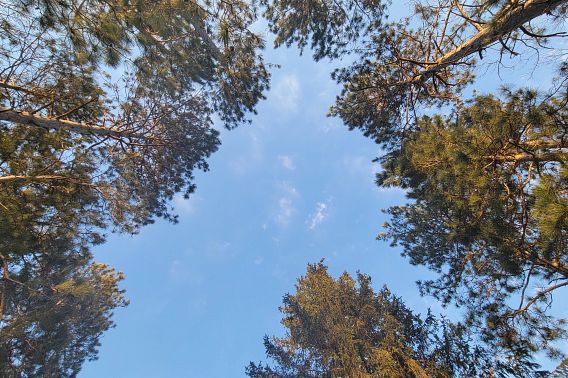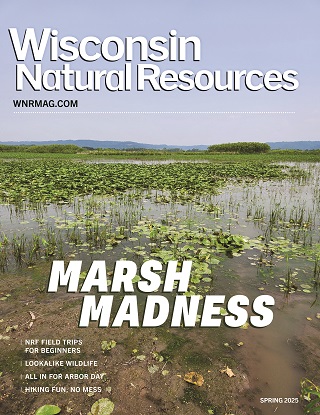Contact: Craig Czarnecki, DNR Air Management Program Outreach Coordinator
Craig.Czarnecki@wisconsin.gov or 608-250-0945
DNR Celebrates Air Quality Improvements, Accomplishments During Clean Air Month
 The DNR is celebrating Clean Air Month to highlight the importance of air quality and ways we can all contribute to making our air cleaner.
Photo credit: Wisconsin DNR
The DNR is celebrating Clean Air Month to highlight the importance of air quality and ways we can all contribute to making our air cleaner.
Photo credit: Wisconsin DNR
MADISON, Wis. – The Wisconsin Department of Natural Resources (DNR) welcomes Clean Air Month this May by celebrating the accomplishments of the last 20 years, including the improvement in overall air quality in Wisconsin.
Air quality successes over the last twenty years include an 88% decrease in sulfur dioxide concentrations, a 35% decrease in fine particle pollution and a 25% decrease in ozone concentrations along the state’s Lake Michigan shoreline.
While Wisconsin has seen overall pollution reductions, the DNR’s 2022 Wisconsin Air Quality Trends Report shows that levels of certain pollutants have plateaued or even slightly increased in some areas in recent years. To better illustrate these trends, the DNR launched an interactive StoryMap, which illustrates Wisconsin's air quality trends for each pollutant over the last 20 years.
“We’ve made great air quality progress in much of the state, but more challenges lie ahead,” said Gail Good, DNR Air Management Program Director. “Together with our fellow agencies and research partners, the DNR is making great strides in research, monitoring, policy-making and outreach to better understand and make continued progress toward our air quality goals.”
Other ongoing DNR efforts to protect Wisconsin’s air quality and make it easier for Wisconsinites to make a difference include:
- Clean Diesel Funding – The DNR regularly administers funds through the Wisconsin Clean Diesel Grant Program to projects that improve Wisconsin’s air quality and address climate change. Diesel engines emit harmful pollutants that can contribute to serious public health problems. The Wisconsin Clean Diesel Grant Program is part of the Diesel Emissions Reduction Act (DERA) and is funded through the U.S. Environmental Protection Agency. Since 2008, the program has updated or replaced more than 5,200 pieces of equipment, reducing diesel emissions by more than 625,000 tons.
- Enhanced Ozone Monitoring – DNR’s state-of-the-art mobile air monitoring lab will spend the 2023 ozone season in Milwaukee. Additionally, DNR-enhanced ozone monitors will be on board the Viking Octantis expedition cruise ship this summer. In cooperation with the National Oceanic and Atmospheric Agency (NOAA) Great Lakes Environmental Research Lab, the monitors on Octantis will help researchers study how ozone develops over Lake Michigan and the rest of the Great Lakes. Learn more about ozone research projects like this one in the Spring 2023 issue of Wisconsin Natural Resources Magazine.
- Air Reporting System Updates – The web-based program, used by facilities across the state to submit Emissions Inventory (EI) Reports, was updated this year. The updates streamline the user experience, improve data quality, and increase the efficiency of inventory processing. The data submitted to this system is not only used to determine compliance with permitting requirements, but it also helps the DNR make informed policy decisions and provides an understanding of the total emissions in the state.
- Document Language Translations - The DNR translated documents from the asbestos team into both Spanish and German to better assist limited English proficiency populations that may work on asbestos renovation and demolition projects. These crews do important work and having a document they can refer to in their primary language bridges the gap in understanding and allows them to more accurately follow regulations and protect the health of workers and the public.
To get kids involved in the air quality celebration, the DNR’s 12th annual Air, Air Everywhere poetry contest is underway. The DNR is accepting entries from Wisconsin’s third, fourth and fifth-grade students through May 5. Winners will be announced at the end of the month, and the three winning poems will be posted to the program’s Air, Air Everywhere poetry contest webpage.
For more ways to stay up to date on the current air quality:
- Visit DNR’s Do a Little, Save a Lot webpages for ideas on how we can all reduce our impact on the environment.
- Download the free WisconsinAQM mobile app to receive air quality updates from anywhere using a mobile device. The app includes an interactive map of near real-time data from the state’s air monitoring network, individual monitoring station reports, weather information and more. Download from the Apple App Store or Google Play Store.
- Subscribe to the DNR's air quality news and notices newsletter.
- Talk with DNR Air Management Program staff at OutWiGo Green at Kettle Moraine State Forest – Southern Unit on Saturday, May 13 from 10 a.m. to 4 p.m.
Visit the DNR’s Clean Air Month webpage for more links to resources and information.

